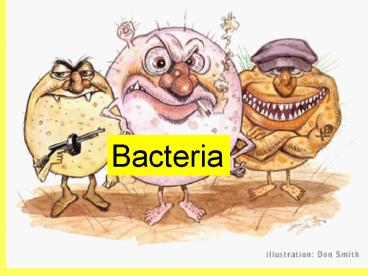Bacteria PowerPoint PPT Presentation
Title: Bacteria
1
Bacteria
2
Compare Prokaryotic Cells and Eukaryotic Cells
- Prokaryotic Cells
- mostly unicellular organisms
- No membrane organelles, no nucleus
- Smaller than eukaryotes
- Kingdoms Archaebacteria
- Eubacteria
- Eukaryotic Cells
- Unicellular and multicellular organisms
- Membrane organelles, has a nucleus
- Cells larger than prokaryotes
- Kingdoms Protista
- Plantae
- Animalia
- Fungi
3
Archaebacteria
- Live in extreme environments
- Chemosynthetic
4
Examples of Archaebacteria
- 1. Methanogens
- 2. Extreme Halophiles
- 3. Thermoacidophiles
5
Methanogens
- Methanogens- convert hydrogen and carbon dioxide
into methane gas - Anaerobic (doesnt require oxygen)
- Chemosynthetic
- Found in swamps, sewage plants, intestinal tract
of humans and cows - Reproduction - asexual,
- binary fission
6
Extreme Halophiles
- Chemosynthetic use salt to make ATP
- Habitat- extremely salty environment
7
SALTY
8
Thermoacidophiles
- Live in acidic environment
- high temperatures 110 degrees centigrade
- pH less than 2
9
HOT
10
EUBACTERIA
- Found everywhere
- Reproduction asexual binary fission
- Reproduction sexual - conjugation
- Cell walls made of peptidoglycan
11
Shapes of Bacteria
- Cocci-spherical shape
12
Rod shaped - bacilli
13
SPIRILLA- spiral shaped bacteria
14
(No Transcript)
15
(No Transcript)
16
Arrangement of Bacteria
- Staphylo in grape-like clusters
- ex staphylococcus
- Strepto in chains
- ex streptococcus
- Diplo in 2
- ex diplobacillus
17
Reproduction
- Asexual Reproduction
- One parent produces one or more identical
offspring without fusion of gametes - - binary fission- bacteria
- copies its chromosomes(1),
- the cell grows, splits and is
- genetically identical
18
Reproduction
- Sexual Reproduction
- - conjugation one bacteria transfers all or
part of its chromosomes to another cell through a
pilus (p. 490)
PowerShow.com is a leading presentation sharing website. It has millions of presentations already uploaded and available with 1,000s more being uploaded by its users every day. Whatever your area of interest, here you’ll be able to find and view presentations you’ll love and possibly download. And, best of all, it is completely free and easy to use.
You might even have a presentation you’d like to share with others. If so, just upload it to PowerShow.com. We’ll convert it to an HTML5 slideshow that includes all the media types you’ve already added: audio, video, music, pictures, animations and transition effects. Then you can share it with your target audience as well as PowerShow.com’s millions of monthly visitors. And, again, it’s all free.
About the Developers
PowerShow.com is brought to you by CrystalGraphics, the award-winning developer and market-leading publisher of rich-media enhancement products for presentations. Our product offerings include millions of PowerPoint templates, diagrams, animated 3D characters and more.

